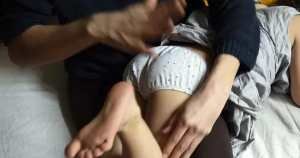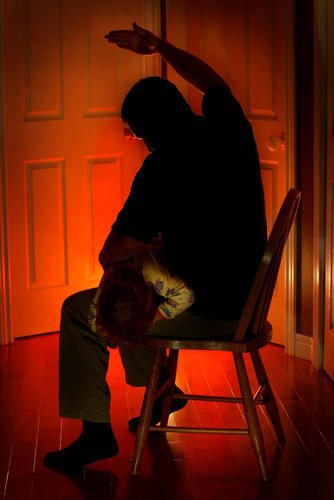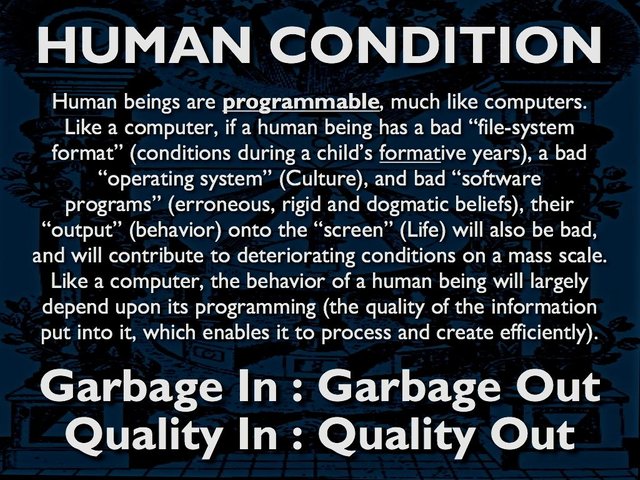I was Spanked and I Turned Out OK—or did I?

Most everyone has heard or used the phrase, “I was spanked and I turned out ok.”
This expression represents acceptance of kid hitting. It sits at the heart of American spanking culture and conjures similar phrases like, “My parents spanked me and that is why I spank my kids,” and “if more children were spanked there would be fewer brats running around.”
Cliché’s such as these not only promote spanking acceptance but also encourages and praises this type of punishment, which research evidence abundantly suggests can damage children.(html comment removed: more)
Parents use corporal punishment to allegedly correct unacceptable behavior, stop a child from disobeying or hurting themselves, but they usually "do not intend" to injure the child. They only want to command the child’s attention and correct bad or dangerous behavior.
Definition and statistics of spanking
Spanking generally include soft swats on the buttocks, use of implements like a board or rod or flyswatter. It could also be a slap across the face or other parts of the body. Some may even beat their child with a belt and call it spanking.
One issue here is that parents and professionals disagree on a clear definition of spanking, especially since most parents refer to any physical discipline as spanking in order to justify the act. In reality, spanking is just a euphemism for hitting.
The American Academy of Pediatrics defines spanking precisely as “striking a child with an open hand on the buttocks or extremities with the intention of modifying behavior without causing physical injury."
Taking this definition into account—and as previously mentioned—the prevalence of spanking is high. Studies suggest a decline in spanking the last few years, but the majority of parents still administer it.
According to a Harris Poll conducted in 2013, 4 in 5 or 81% of parents said it is sometimes appropriate to spank children. Two thirds, or 67% say they were spanked as a child, which is down from 80% in 1995 (Most polls and studies vary between 65% and 90% today).
A Columbia University study and a similar Harris poll said most parents spanked their children consistently at ages 3-5. The poll also validated the cycle of spanking as true. Roughly 73% of parents who spank were spanked as children, whereas 25% were not.
This frequency of spanking implies that many people see it as a valid form of punishment. But why?

Hitting in a calm manner
Proponents of spanking argue spanking is acceptable if parents understand what they are doing, and they perform it in a calm manner. They argue if parents explain to their children why they are being spanked for, it is a reasonable form of punishment. Problems only arise, say pro-spankers, when people hit out of anger or impatience.
In a 2014 Time article, Dr. Jared Pingleton defended this view. “If he or she deliberately disobeys, the child should be informed of the upcoming spanking and escorted to a private area. The spanking should be lovingly administered in a clear and consistent manner.”
Although to hit in a loving manner is an odd and perplexing perspective, there is some evidence to support Pingleton’s argument.
Dr. Robert Larzelere and his colleagues at Oklahoma State University conducted a positive study on spanking. It concluded that “two open hand swats to the buttocks after a child has defied an authority figure led to greater reduction of child defiance or anti-social behavior than 10 of 13 alternative discipline techniques.”
Another argument against the non-hitting position suggests that the anti-spanking studies cannot prove whether the practice directly causes misbehavior, mental illness, hostility or other problems.
A New York Times Article also defended this idea. “Studies cited by opponents of corporal punishment, Dr. Baumrind contended, often do not adequately distinguish the effects of spanking, as practiced by non-abusive parents, from the impact of severe physical punishment and abuse."
Spanking causes long term harm
Opponents of spanking have a different perspective, though—and at least one major institution altogether discourages the practice of spanking.
In a 2012 pressroom comment, The American Pediatric Association said, “The use of physical punishment to discipline children has been linked to a range of mental health problems and is strongly opposed by the American Academy of Pediatrics.”
Not only have a few articles hinted spanking causes mental health problems; dozens of scientific journals have stated that spanking causes a variety of long term affects, including hostility and use of violence through multiple generations.
A 2012 article from the American Psychological Association cited one such piece. “A study published last year in Child Abuse and Neglect revealed an intergenerational cycle of violence in homes where physical punishment was used. Researchers interviewed parents and children age 3 to 7 from more than 100 families. Children who were physically punished were more likely to endorse hitting as a means of resolving their conflicts with peers and siblings.”
There are more damning studies than ones that suggest hostility or mental health problems. Newer research claims physical punishment damages a child’s brain. These studies confirmed children who were spanked (received harsh corporal punishment) were likely to lose some grey matter tissue.
A 2014 CNN Article said, “Researchers found children who were regularly spanked had less gray matter in certain areas of the prefrontal cortex that have been linked to depression, addiction and other mental health disorders…”

Where the debate stands
This is where the current debate stands; it shuffles between experts and parents marshaling these arguments, or similar ones, based on the evidence.
Overall, advocates of spanking contend that spanking can be used if done gently and with love and care, but very little data supports this view. They also cite most evidence against spanking is only softly linked, and not an exact cause.
Still, most pro-spanking researchers do not advocate harsh corporal punishment with implements, as this tends to "escalate to abuse." Finally, pro-spankers complain that anti-spanking studies often neglect to define the differences between spanking and harsher forms of physical punishment.
Anti-Spankers are winning
By contrast, anti-spankers argue there is an immediate risk spanking could cause permanent brain damage, so they ask: “Is hitting your child worth the risk of permanently damaging their brain”? Anti-spankers say that even if their data is sometimes unclear, there are dozens of studies that refute spanking and only a few that defend it.
Leading researcher Elizabeth Gershoff of the University of Texas echoed this, “I can just about count on one hand the studies that have found anything positive about physical punishment and hundreds that have been negative.”
This means parents should weigh and consider the evidence before rushing to the conclusion they should “spank because their parents spanked them,” or because they “were spanked and turned out okay.”
These phrases hold little water in the face of most of the evidence; and even though there is a minority of evidence that suggests "soft" spanking may help, the majority of the research literature rejects the practice as dangerous. If a person is saying that they were hit and they turned out ok as a justification for hitting their children, they likely did not turn out ok.
It is time to stop hitting children. The evidence is in.
Break the cycle.

My name is Sterlin. Follow me @ Psychologic-Anarchist. I also run the Psychologic-Anarchist Facebook page and produce many YouTube videos. My interests lie in the intersection of counseling psychology and anarchism. I write about the depredations of psychiatry, and also the new philosophy of compassionate anarchism. We have a large community devoted to discussing psychology and relational voluntaryism.

This is a very big eye opener. I too grew up in a home that believed in spankings. Some of my siblings got it worse than what they should have. Even at a very young age, I ran to a neighbor to make them stop my mom from "beating" my youngest sibling (she was 4) over an accident. We would also get our heads banged together if we argued (which 40 something years later still makes me head shy). Because I grew up with that environment, I too spanked my child when he was little, to correct his behavior. It was random that I did so, but it stopped after the sad look he had in his eyes. As he got old enough for school, I was told he almost hit a girl who made him mad. That was the longest conversation I had with him about how hitting was wrong. From that day forward any punishment only consisted of no electronics, no tv, and bed time was an hr earlier (anywhere from a few days to a week).. I now have a mellow teen, who knows how to control his emotions and actions. I do still have my drawbacks on how I feel about parents who do/don't spank. I have seen some kids (one being a relative) that push all the right buttons. There is a fine line between a few swats, and downright paddling with a belt, or whatever means. But I do have to say, it is never ok to hit a child in the head, no matter what the reason.
This was a very thoughtful and reflective response. Thank you for sharing. Personally, I feel that even mild swats can do damage to children based on all the recent evidence. Nonetheless, I applaud that fact that you came to realize the inconsistency between your behavior and what you were teaching your child. It must have taken a lot of courage for you to admit you were wrong and start parenting with a different style. Most parents wouldn't have the self-awareness to acknowledge that kind of contradiction between what they say and do.
Thank you :-) and yes, it indeed took a lot of courage. To this day I sometimes wish I could take back those horrible moments. I am just glad that I stopped when I did, especially when he almost turned his anger on another kid. It was hard to teach myself to hold my breath, count to 10 and walk away. When I calmed down, I would talk to him about his actions. I don't recall too much about my own childhood since learning to block most of it out. But I do know that it did cause me to have anger issues. I learned to control it over the years. I didn't want my son have to live with that also.
I was spanked as a child and into my teenage years. My parents, grand-parents, adult guardians used their hands, belts, used (yes used) fly-swatters, and any blunt force object to enact punishment. I am okay but have difficulty controlling my anger. I have no children and notice it takes a great deal of self-control not to physically punish my nephews when they misbehave or put themselves in danger. I attribute my anger issues with force being used on me as a child to control my behavior.
Midnas. You demonstrate amazing self-awareness in this post. It is true that a lot of times our reactions and volatility stem from attachment trauma and emotional injurious sustained as children. It is not a big surprise that if we were hit a lot, that we would harbor lingering resentment and rage. The key, as you have shown, is to learn to overcome those issues or at least understand them so that you don't repeat the vicious cycle.
Sweet response, friend.
You need to release these bottled up emotions. The anger is only still there because you carry around that emotional hurt with you still, look into meditation, ayahuasca and mdma therapy for healing.
Though I have not tried ayahuasca, I have done some forms of meditation as well as mind altering drugs such as psilocybin and MDMA with some positive effects. I also think that one can reach into the depths of their psyche without catalysts to improve upon it. I may never rid myself of the anger that builds up within, but I have the ability to control it so that it does not affect others negatively. I am okay with that.
That's wonderful, indeed we do not need the tools ultimately.
In my experience, we often have more fear and negativity bottled up than we tend to notice. What helped me, and still does help me greatly, is to conjure up the fears/trauma in your meditation and to feel them completely, mentally as well as the feeling that goes paired with it in the body, when you embrace it completely and know you are still safe in relation to the fear, you can let it go and you will cry it out.
Practicing metta meditation can also be powerful (in short, it's meditating on love and compassion for yourself and others, even those you might feel anger to, it's very simple but can be very powerful. Peace :)
Benice, this is an amazing response. Exploring emotional content and crying it out is a perfect start to learning to recognize the emotions and the pain. It is a form of emotional intelligence that allows you to grow and to become even more self-aware. Thank you for sharing.
I love this chart. Hah.
Nice :)
I love this article. I just followed you.
I want to write one comparing child abuse to war mentality. Here is an extreme case: Hitler was severely abused by his Jewish grandfather, and then murdered millions of people.
So, some people say that spanking "works." Sure, it might stop a kid from doing something at the moment, but it does nothing to empower them to positive behavior in the future. It doesn't empower them at all, so isn't the best thing to do.
When people say, "I was spanked and turned out ok..." Do they mean that they are not murderers and pimps? Are they living as fulfilled a life as they could have?
I like to compare child rearing to computer programming. Every interaction with my children is adding code to their brains, which will be expressed when they are grown. What code are we adding when we punish or criticize? We are adding bugs, which will then need to be dealt with.
I have a feeling that when humans abolish child abuse in all forms, we will experience world peace.
Humans are programmable whatever happens to them as children will stay with them forever , example clapping when a child falls down you just programmed a child to "shoot themselves in the foot" aka they will fail on purpose to get attention . Careful of all you actions when you are with a child as that will directly program them in a good or bad way.

Hi and thanks for the post. It was an interesting read and I really like the fact that you focused on the evidence. That is what I think a lot of people struggle with - feeling about what is right vs evidence of what is right. Anyway, I think you might find this one interesting and I was hoping to hear your thoughts on the story. https://steemit.com/life/@melek/the-girl-who-couldn-t-cry
Thanks :)
Wow. Thanks a lot for the awesome comment and acknowledging that. I will gladly take a look at your piece.
Awesome and thank you! :)
Another great piece @sterlinluxan ... I'm sure there's still some subconscious trauma I'm holding onto from some of the rather aggressive spanking my dad carried out. I'm curious to know what you think of time-outs as well... and what peaceful parenting methods you've seen that can take the place of "punishments" being doled out. Thanks! Looking forward to reading more.
Thanks, Randy. I am not as opposed to timeouts as hitting, but it is still a form of punishment. If possible, I think using communication, modeling, and teachable moments is the best way to help children. Whenever we use punishers, we model to our children that these are acceptable methods of handling problems. And we know from the literature that negative punishers are not as helpful as positive reinforcement.
One thing that is pretty useful is the paradoxical teaching. This means when a child is being destructive or causing problems, it might work to ask them to act out and to fully express their feelings in the moment. This will allow children to come to terms with their emotional content, and it may allow them to calm down quicker. However, this may not be appropriate for all children.
I have more ideas, but these are a few quick thoughts. Thank's for the comment.
This is a very well written. You present both sides are the debate well, which is nice to see. I felt a lot of anger when I read the quote by Dr. Jared Pingleton: the idea that you can hit someone in a loving manner is baffling.
Looking forward to more articles from you. I'm now a follower - also looking forward to when that means something :)
Thanks so much Bitcalm. I agree completely. Hitting does not equate to love in my mind, and thus this is a disheartening position to see articulated, especially by a psychologist.
It looks like you and I share common interests, so I will be following you as well. Thank you.
I also send you a tip for that article, but in the memo I meant to say "blog" not "blow." lol
Really against spanking
Thanks for the thought provoking article!
You are welcome. This stuff is my absolute passion.